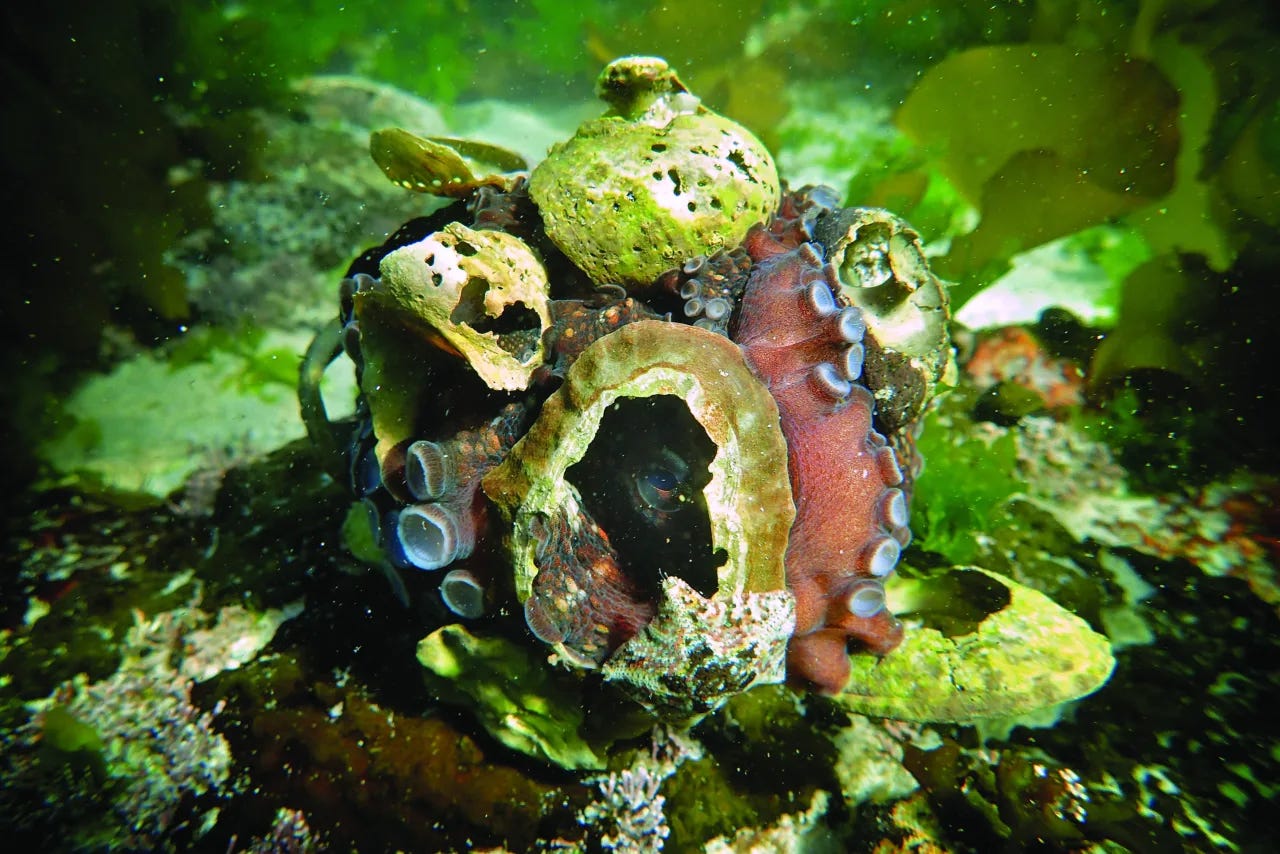21 December 2021. Gen Z | Octopus
Making sense of Gen Z | Octopuses are smart creatures. Why are we still eating them?
Welcome to Just Two Things, which I try to publish daily, five days a week. Some links may also appear on my blog from time to time. Links to the main articles are in cross-heads as well as the story.
#1: Making sense of Gen Z
Prospect has a piece by four academics who have been researching the Gen Z cohort, in the US and the UK. As academics, they had all been teaching Gen Zers, and had noticed that they were “strikingly different” from those of a few years earlier:
They had a new vocabulary for talking about their identities and their places of belonging; they were hardworking but also placed an emphasis on their wellbeing and self-care, and they engaged in activism in a distinctively non-hierarchical, collaborative manner.
Quick declaration of interest: one of the academics is Linda Woodhead, the former co-Director of Lancaster University’s Institute of Social Futures, where I am on the Advisory Board. I first heard about this research a couple of years ago. It’s good to see an accessible version of the work, in the shape of an extract from their book.
And while here: as a futurist I do believe that generational cohorts have different underlying values—in fact changing values are one of the critical drivers of change over time. Yes, sure, the youngest Millennial (say 25 this year) is going to have more in common with an old Gen Zer (24 this year) than the oldest Millennials (41 this year). But cohorts represent a centre of gravity of values.
The work described in Prospect is proper academic work. It draws on a range of disciplines; it has collected data; it has established facts; it has explored the wider historical context. And they set out to understand the Gen Zers on their own terms.
One of the striking findings is how contradictory the world of Gen Z is:
They have more “voice” than ever before (a meme or a YouTube or TikTok video can reach millions), but they also have a sense of diminished agency “in real life” (institutions and political and economic systems seem locked, inaccessible to them, and wrongheaded). They are often optimistic about their own generation but deeply pessimistic about the problems they have inherited: climate change, police violence, racial and gender injustice, failures of the political system, the fact they have little chance of owning a home or doing better than their parents.
There’s a few headings here that help to navigate this world.
Technology
Technology is woven deep into the lives of Gen Zers, of course.
Digital technologies have been instrumental in a push towards collaborative activity. Many postmillennials have been exposed from an early age to software and websites that promote joint efforts. They became accustomed to using GroupMe, Facebook Messenger and Skype to create documents jointly, engage in group chats and share calendars, and they became familiar with “crowdsourcing,” “crowdfunding.”
But unlike the Millennials, they’re also more aware of the downsides of technology, and more cautious aboout.
They are coming of age when techno-optimism is turning into techno-scepticism, as society is reeling from data breaches and evidence of deceptive practices and “surveillance capitalism” by technologists—and as we have come to realise that artificial intelligence could be seriously disruptive to human society. They are aware of bot-enabled blackmailing, hacking and fake news; potential spying by home devices; and how facial recognition can be used for racial profiling.
Identity
Identity and its construction is more complex in a digital world. It is also finely grained, often involving a careful consideration of elements of inherited elements of identity:
Gen Zers hold on to and even cherish some of their inherited identity markers, while others are rejected: this process of selection and rejection reflects a critical interrogation of the labels that have been ascribed to them by family or society. Casper ter Kuile, a theologian and author of books on spirituality, describes this process as “unbundling and remixing.” Unbundling means that we separate out the different elements from a whole collection of offerings; we then remix some or all of them to suit ourselves—to make them entirely personalised and fully authentic.
In the research, gender and sexuality attributes came up most often—and this is perhaps the area where Gen Z has created more social disruption than any other.
Surveys reveal that the majority of postmillennials accommodate gender-neutral pronouns. The Pew Research Center, using surveys carried out in 2018, reported that 35 per cent of postmillennials in the US know “someone who prefers that others use gender-neutral pronouns to refer to them.”
Wellbeing
The post-Millennial generation is used to talking about wellbeing, and are more open than previous generations about mental health, “about experiencing periods of anxiety and depression and feeling burnout, compassion fatigue and, at times, hopelessness.”
The clear articulation of mental health issues raises the question as to whether this generation has greater mental health struggles or is simply much better at naming their problems and seeking care. It is noteworthy that the word “stressful” appears in our corpus with unusually high frequency when compared with broader language use.
The researchers looked at whether Gen Zers have worse mental health than previous generations, and they might:
91 per cent of postmillennials aged 15 to 21 reported experiencing physical and emotional symptoms associated with stress, including depression and anxiety.
But: they’re also more accepting of mental health issues as being a normal part of life rather than pathologising them.
(Image: Extinction Rebellion)
Change
Gen Zers think that the political system is broken, in both the US and the UK:
In our survey of representative samples of postmillennials in the US and UK, we asked about the political systems in their respective countries. The majority in each country believed that the system needed to be reformed—either to “some” extent (35 per cent in Britain and 27 per cent in the US) or “a lot” (40 per cent in each country). Around 15 per cent in each country thought that the system was completely broken and needed to be replaced.
I’d be interested to see comparative data for other generations here. But they also accept that they’ll have to make change happen:
Given their concern for both global and local issues, and anxiety about the incapacity of their elders or traditional institutions to bring about necessary progress, it is no surprise that our interviewees repeatedly noted the imperative of tackling the challenges and inequalities they saw all around them. “I know what ‘progress’ is supposed to look like,” said one interviewee, Eve... “yet it’s so, so, so far away, and current events can feel like you’re being dragged further and further away from that goal.”
#2: Octopuses are smart creatures. Why are we still eating them?
One of the pieces I meant to write earlier this year was about the film about a diver’s relationship with an octopus that won the Oscar for Best Documentary. The diver was South African, and the Daily Maverick had a long profile. The reason it’s come to mind is that I saw octopus on a menu at the weekend, and wondered about it: by all accounts octopus are as intelligent as whales and dolphins, and we’ve decided, generally, to stop eating these other sea creatures.
(Octopus using shells to protect itself. Photo courtesy of Sea Change Project.)
My Octopus Friend tells how Craig Foster meets the octopus while exploring the kelp forests in the Atlantic off the coast of Cape Town. Foster started this as a daily routine after realising he was burnt out, and it took him a while, after first seeing the octopus, to realise that it was, as it were, holding out a tentacle in friendship.
Some of the most memorable times he’s spent in the sea have been with a common octopus he befriended after she literally reached out to him, overcoming her instinctive fear. The two formed an unprecedented bond that became the subject of a documentary that caused a worldwide stir in 2020 when it was dropped on Netflix.
The film shows how, over the course of a year, Foster was able to document this octopus displaying a vast repertoire of astonishing behaviours, from walking along the bottom of the sea using two arms as though bipedal, to literally playing with fish, and using shells to instantaneously create a defensive shield.
There’s a good summary of the multiple facets of octopus intelligence in a piece on the Natural History Museum website. They are just strangely different creatures, with brains in all of their arms, capable of acting independently of each other. They have the largest brain-to-body ratio of any invertebrate creature, and about as many neurons as a dog (500 million). They also have three hearts.
They are able to use tools, and there is evidence of octopi collecting shells for future use as protection against predators. Although most octopi species are anti-social, one species of octopus builds small villages. They can recognise people (and even squirt water at people they have taken a dislike to).
And in the New Scientist there’s a story about female octopi throwing objects at males they think are harassing them.
As the Daily Maverick article says, of Craig Foster’s experience,
It is as if humans had managed to make contact with an alien life form – and overcome the vast gaps of understanding such a meeting might conceivably entail. It’s thanks to the level of trust that Foster forges with this octopus that the film becomes one of those rare cinematic events when a reality that’s revealed seems somehow more imaginative, dreamed up or unreal than most fictional films.
So: why are we still eating them?
The trailer for My Octopus Friend is here:
j2t#232
If you are enjoying Just Two Things, please do send it on to a friend or colleague.




